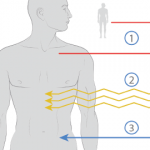Daniel Aletaha, MD, MCHS, MBA, Now MedUni Vienna’s Division of Rheumatology Chair
 On July 1, 2019, Daniel Aletaha, MD, MCHS, MBA, was appointed chair of MedUni Vienna’s Division of Rheumatology in the Department of Medicine III. Dr. Aletaha began his study of medicine at the Medical Faculty of the University of Vienna (now called Medical University of Vienna), where he completed his specialty training in rheumatology. He also did a research stint from 2004–2006 at the National Institutes of Health, Bethesda, Md. He holds a Master of Clinical Health Science degree from Duke University, Durham, N.C., and obtained an MBA from Danube University Krems in 2019.
On July 1, 2019, Daniel Aletaha, MD, MCHS, MBA, was appointed chair of MedUni Vienna’s Division of Rheumatology in the Department of Medicine III. Dr. Aletaha began his study of medicine at the Medical Faculty of the University of Vienna (now called Medical University of Vienna), where he completed his specialty training in rheumatology. He also did a research stint from 2004–2006 at the National Institutes of Health, Bethesda, Md. He holds a Master of Clinical Health Science degree from Duke University, Durham, N.C., and obtained an MBA from Danube University Krems in 2019.
Commenting on the success of his career to date, Dr. Aletaha says, “I have been very lucky in my life: I had, from my childhood on, supportive parents; from my mentor [former division chair Josef Smolen, MD], I learned almost everything in terms of how to build a team, how to engage a team and how to motivate people to go into certain directions that they’d like to go but may not have realized yet.”
Dr. Aletaha plans to incorporate modernized teaching methods into the division. “We still need classical, lecture-room-based teaching,” he says, “but we also have to face the future, in which a lot of decision making will be highly assisted by algorithms and information technology systems.”
Dr. Aletaha is also holding onto some well-established methods. He started a unique lecture room class called Mysteries of Medicine. He and an infectious disease colleague present lab results, history and imaging material with real patients, inviting students to apply their knowledge to make complex diagnostic and treatment decisions.
“The rheumatologist is, in many cases, a detective,” he notes, a characterization often borne out in calls for consultations from colleagues.
Dr. Aletaha is well known in international rheumatology circles, having participated for many years in such joint efforts as developing the 2010 ACR/EULAR RA Criteria, among other initiatives. Collaborations via international networking are also a prominent feature of his work. “In rheumatology, the community is a very special one. … It’s important to integrate yourself into that network and expand it,” he says.
Michael S. Putman, MD, Adds EBRheum Podcast to Rheumatology’s Mobile Resources
 Michael S. Putman, MD, a clinical instructor of medicine at Northwestern University, Evanston, Ill., states outright that he loves rheumatology and evidence-based medicine. While still a second-year rheumatology fellow at Northwestern, he found a way to combine those interests with a third: enthusiasm for podcasts, which he believes offer “a great way to be a continuous learner.”
Michael S. Putman, MD, a clinical instructor of medicine at Northwestern University, Evanston, Ill., states outright that he loves rheumatology and evidence-based medicine. While still a second-year rheumatology fellow at Northwestern, he found a way to combine those interests with a third: enthusiasm for podcasts, which he believes offer “a great way to be a continuous learner.”
Dr. Putman began his EBRheum podcast in January 2018. Since that time, he has posted more than 60 episodes, each between 10 and 20 minutes in length. Each episode applies principles of evidence-based medicine to an important manuscript in the field of rheumatology. His aim, he says, has been to make the critical analysis of published studies an approachable process. With the deluge of scientific literature increasing, Dr. Putman hopes his podcasts “encourage others to be excited about critically reading primary literature.”
When Dr. Putman began the project, his initial plan was to script all of the episodes. He found this impacted the sincerity and authenticity of his monologues, so he converted to a loose outline. Dr. Putman says he strives to strike a happy medium between strict adherence to proved therapies and relying on expert opinion. “I am not a medical nihilist,” he states, and believes rheumatologists should use evidence-based medicine to augment received wisdom and clinical experience.
Dr. Putman is a member of ACR’s Fellows-in-Training Subcommittee, and has been an active and vocal participant in rheumatology advocacy during the COVID-19 pandemic.



